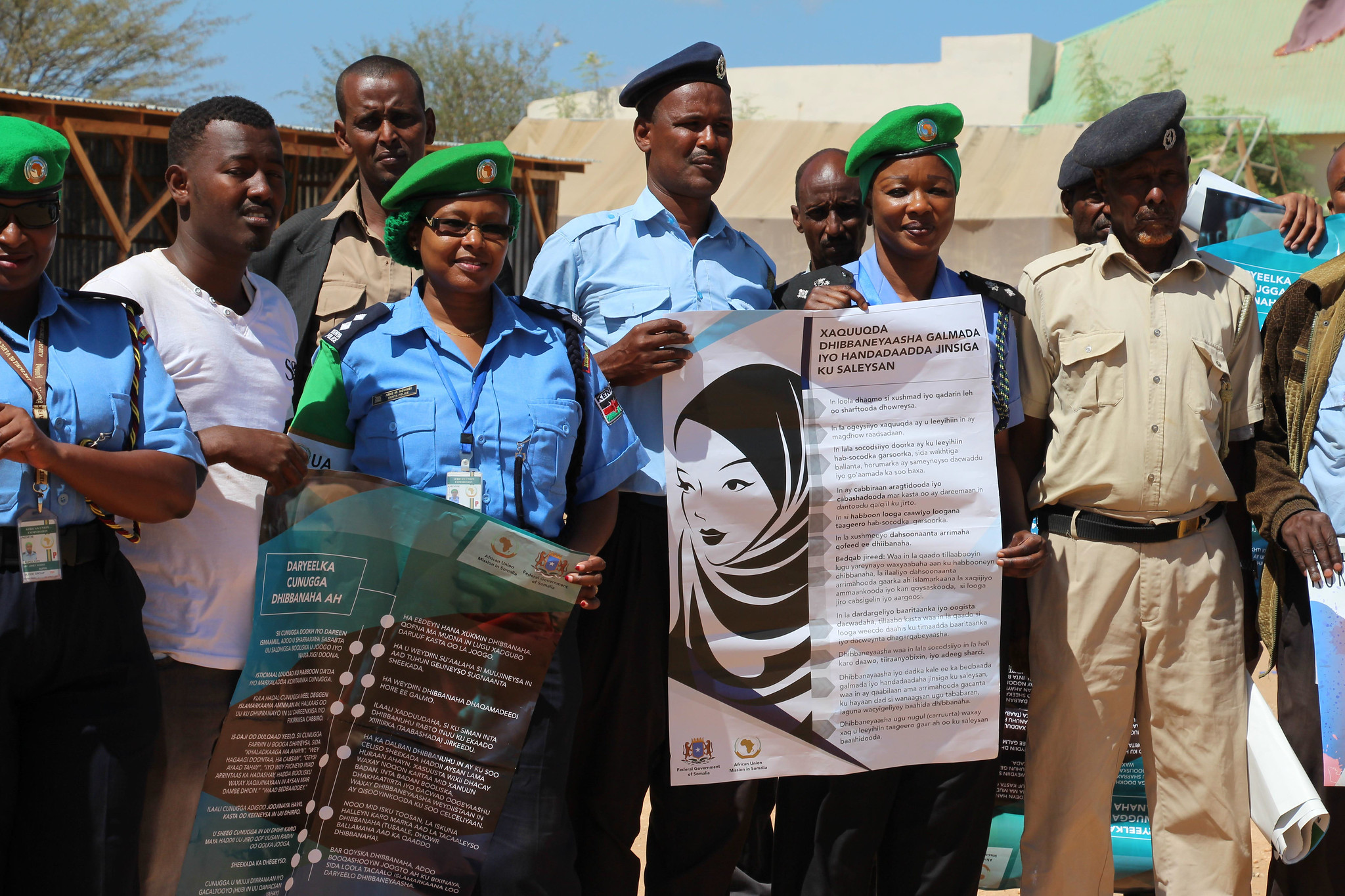Mogadishu (SONNA):As part of celebrations to mark International Human Rights Day, African Union Mission in Somalia (AMISOM) senior police officers engaged in a virtual roundtable discussion with gender focal persons across the mission to recommit to the fight against Gender Based Violence (GBV) in the workplace.
The discussion also aimed at sensitizing civilians on the need to be vigilant to protect potential victims, offer support to survivors and ensure that perpetrators are brought to book. AMISOM’s Protection, Human Rights and Gender (PHRG) unit organized the discussion held as part of the mission’s activities to mark the end of the global campaign 16 Days of Activism against GBV.
While opening the discussion, AMISOM Chief-of-Staff, Deputy Commissioner of Police (DCP) Rex Dundun, noted that the fight against GBV has always been a priority for AMISOM, especially in regard to protecting civilians, but that recommitting to the cause with a deliberate focus on the workplace, specifically across all of the mission’s spaces, is very important.
“The importance of finding lasting solutions to GBV in the workplace cannot be over-emphasised, which is why in this discussion, our focus should constantly be on ways to put in place the best practices to protect not only the people of Somalia but also the mission personnel, as this can significantly diminish the productivity of victims in the workplace,” DCP Dundun said.
He noted that GBV can affect both sexes, male and female, but acknowledged that women are often more susceptible, highlighting the harmful effects of the vice on them, including physical, social, psychological and economic impacts.
The Chief-of-Staff called upon participants to approach the discussion by looking both internally and externally, with an intent to utilize the in-mission solutions elsewhere to support counterparts in the Somali Police Force and other institutions to equally prevent GBV in their workplace.
AMISOM’s Head of the PHRG unit Kareem Adebayo, highlighted this year’s Human Rights Day theme: “Recover Better: Stand up for Human Rights”, saying there was no better time to discuss recovery from GBV in the workplace than now, considering the onslaught of the global pandemic COVID-19 destroyed people’s means and brought with it unprecedented GBV cases and abuse of especially women in the workplace.
“The focus therefore is on the need to build back better by ensuring human rights are central to recovery from GBV, for everyone should be free from any form of violence, including GBV elsewhere and the workplace,” said Adebayo.
AMISOM Protection Officer Gloria Jaase, while highlighting the challenges to effective elimination of GBV in the workplace, urged participants to constantly educate themselves on what constitutes GBV.
“GBV in the workplace goes beyond just sexual harassment. Sometimes it is verbal or non-verbal, and extends all the way to cyber bullying and actual bullying which is sometimes physical. As long as it is targeting a specific gender, it is GBV. It may not necessarily be in the office, since it goes all the way to work trips as well, including any other spaces accessed in the capacity of work. It is broad, so we need to constantly educate ourselves on it. It is only when we know what to look out for that we are able to report and also be helpful during investigations,” said Jaase.
Sexual Exploitation and Abuse (SEA) came up prominently as one of the greatest forms of GBV in the workplace, with AMISOM Police Gender Officer, Chief Superintendent of Police Stella Sedame, enlightening participants on the mission’s Zero Tolerance to SEA outlook.
“Across all AU Peace Support operations, we strictly adhere to the Zero Tolerance to SEA code, with no discrimination to rank, component or whether on-duty or off-duty. It applies to all of us, whether military or civilian or police. There are reporting mechanisms in place, and the Board of Inquiry into these matters is very strict on this,” stated CSP Sedame while highlighting the mechanisms across the mission to address GBV.
AMISOM Human Rights Officer Kahbila Mbuton, who was also the moderator of the discussion, shed light on how GBV is a human rights abuse, pointing out relevant international legal instruments that can be relied upon to address issues of GBV in the workplace.
“The United Nations defines Human Rights as rights inherent to all human beings, regardless of race, sex, nationality, ethnicity, language, religion, or any other status. These rights include the right to life and liberty, freedom of opinion and expression, the right to work and education, freedom from slavery and torture, and many others. Every person in the world is entitled to enjoy these rights without any form of discrimination, and so GBV in the workplace is a human rights violation,” said Kahbila.
As a harmful act directed to an individual based on their gender, Kahbila stated, GBV is deeply rooted in gender inequality, the abuse of power and harmful norms, which must all be challenged.
Participants, who pitched in to the discussion from Mogadishu and across the sectors, looked to identify best practices and workable solutions with strategies to enhance the prevention of and response to GBV in the workplace.
Those best practices include the establishment of effective mechanisms for reporting of GBV allegations, issues of cultural sensitivity when handling GBV cases, remedial measure for victims of GBV and the need to establish sufficient standby capacity with relevant expertise to investigate GBV cases.
DCP Rex Dundun said that the suggestions from the discussion will be inducted into the already existing frameworks governing the mission on GBV in order to constantly improve prevention and response mechanisms.
This year’s 16 Days of Activism against Gender Based Violence saw the AU Mission in Somalia hold a series of activities, among which a similar discussion held on December 6 to combat violence against women and children in Somalia.
Every year on November 25, the world kicks-off the 16 Days of Activism Against Gender Based Violence campaign, which features a series of events on the subject, ending on December 10, which is International Human Rights Day.





